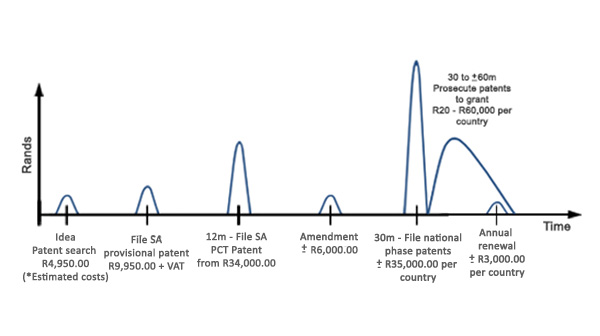Get a Patent for protection or a Patent Pending Number for marketing and deterrence?
Basically, “Patents” are for protection and “Patent Pending Numbers” are for marketing and deterrence.
What is the difference between a Patent and a Patent Pending Number?
“Patents” are typically complete patents, drafted by a patent attorney and prosecuted to grant in countries in which patent protection is required. Once granted, the Patent is enforceable against infringers in patented countries. To engage a patent attorney to draft and file a complete patent in one country costs at least R20,000; to prosecute that complete patent to grant takes at least 12 months; to extend the complete patent to other countries typically costs R50,000-R90,000 per country; to take an infringer to Court takes at least a year; and legal proceedings against an infringer costs at least R1,000,000.
The primary intention of a complete patent is to ensure “protection” by being able to institute action against infringers. However, the associated cost and time means that very few patentees end up using complete patents for protection.

“Patent Pending Numbers are provisional patents, self-drafted by the applicant; filed for only $49 and issued within 1 day. Patent Pending Numbers are effective worldwide for 12 months. Sure, a Patent Pending Number does not entitle you to institute legal proceedings against infringers, but this is something that would have been highly unlikely in any event. However, the Patent Pending Number communicates your intent and right to secure patent rights worldwide. For this reason, a Patent Pending Number is an effective “deterrent“. In addition, marking your product “Patent Pending” communicates that to customers that it is “new” and “technologically innovative”, making it a highly effective marketing tool.
Patent Pending Numbers are perfect for any new product. They are particularly useful when launching new software / website / app.

What is better a Patent or a Patent Pending Number?
For protection, Patents are better than Patent Pending Numbers. However, for marketing and deterrence, Patent Pending Numbers have a small lead on Patents – Patents are limited to the countries in which they are granted, whereas Patent Pending Numbers are effective worldwide. Also, Patents are available to competitors – enabling them to design around the patent; whereas Patent Pending Numbers are maintained secret – keeping competitors guessing about what you may end up patenting.
| Patent | Patent Pending Number | |
|---|---|---|
| Cost: | R20,000 | $49 |
| Drafted by: | Patent Attorney | Applicant |
| Document must: | include a set of claims | Fully describe invention |
| Filed: | Manually by a patent law firm | Self-filed online |
| Time to file: | 2 weeks | Up to a hour |
| Difficulty: | Requires expert assistance | Simple, no expert assistance required |
| Effective within: | 12 months | 1 day |
| Territorial scope: | Country of filing | Worldwide |
| Primary purpose: | Protection | Marketing & deterrence |
| Accessibility: | Publicly available | Secret document |
| Enforceable: | Yes, takes 1yr, min. cost R1m | No |
| Life: | 20 years, if pay annual renewals | 12 months |
